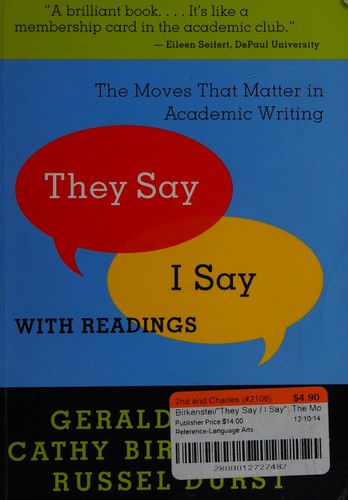UdeRecife reviewed They Say / I Say by Gerald Graff
Review of 'They Say / I Say' on 'Goodreads'
4 stars
It has become common today to dismiss this kind of books, especially from those who tend to have a poor perception of a genre they call self-help literature. It is often said that books promising to help you achieve success in your field are offering nothing more than delusions. If, on top of that, you consider how conventional wisdom has it that in order for one to produce good writing one has to be born with a special gift, you would think that there’s no way to take this particular book seriously. After all, I’ve always believed that myself, being raised to look at crafts not as something within reach of anyone who would learn the right techniques, but more as a rare happening where one would be blessed by his or her good fortune. So why would the contents of this book be of any relevance anyway?
However, after …
It has become common today to dismiss this kind of books, especially from those who tend to have a poor perception of a genre they call self-help literature. It is often said that books promising to help you achieve success in your field are offering nothing more than delusions. If, on top of that, you consider how conventional wisdom has it that in order for one to produce good writing one has to be born with a special gift, you would think that there’s no way to take this particular book seriously. After all, I’ve always believed that myself, being raised to look at crafts not as something within reach of anyone who would learn the right techniques, but more as a rare happening where one would be blessed by his or her good fortune. So why would the contents of this book be of any relevance anyway?
However, after reading it, I thinkI and others like me were mistaken because we overlooked how a well organized method like the one offered in this book, where we are provided with plenty of explanations on the whys and hows of academic writing, can do wonders to our meek abilities in such craft. In fact, by practicing diligently on the many exercises provided throughout the book, not only we come to better understand what college writing demands from us, but also overcome many of the fears we all in some way or another have in having to come up with any cogent piece of writing on the various topics we are subjected to throughout college. To put it succinctly, and contrary to what I previously thought I agree that the authors’ proposal is not as far fetched as I once thought it were, because my experience with this method, as I am now putting it to practice, clearly confirms it.
Of course, many will probably disagree with this assertion [of mine] that this method is a game-changer if you’re a struggling college student having little to no idea on how to become proficient in the kind of writing universities demand from you. Skeptics, of course, may want to question whether this enthusiasm of mine has any grounds of evidence to support it. While it is true that my own anecdata is not of sufficient to provide the broad generalization I’m here making, it does not follow that my general assertion in completely groundless. Take, for example, the many positive reviews others have shared on this site (you can check them out at here: www.goodreads.com/book/show/31706999?rating=5). According to goodread’s user Dreama, “I assign this book to all of my college freshman ENG Composition students. The hype is real.” Shannon, another user of this site, also agrees when she writes, “Most helpful book on persuasive writing techniques I have ever read.” I wholeheartedly endorse what these users are saying and what Shannon calls “persuasive writing techniques”. My conclusion, then, is that, I’m not alone in thinking this is a great book, well deserving its positive reviews.
Another important thing to consider is that, although this book’s title may seem of concern to only a small group of readers, namely those attending college, it should in fact concern anyone who cares about writing as a general craft that is not only useful, but necessary for anyone who needs to communicate effectively and compellingly. In other words, this is not a book just for college undergraduates, but also a great guide for the general public as well. In this sense, this book matters because it deals with an essential craft that is even more needed today when much of the ever growing body of information sharing is done by writing. Ultimately, what is at stake here is the laying out of a solid foundation on which to make writing as tool more effective and productive to society as a whole.
So, as I hope you have by now understood, this exercise of mine leads credence to my assumption that this is in fact a much valuable book both for anxiety ridden college students who can’t make head or tails of how to write a text, but also those of the general public that want to become more clear and persuasive on their writings. Except for this paragraph, the main structure of this review was borrowed from the many templates this book offers as a guide to help you make your point across. To demonstrate this, I have indicated every template I used by putting it in italics, and adding the rest as content on a whim, knowing that I couldn’t fail much if I followed Gerald Graff’s and Cathy Birkenstein’s most valuable suggestions. This, then, I hope, serves as a good proof of this book’s efficacy. Should you read it? If writing is to be an important part of your life, most definitely!

